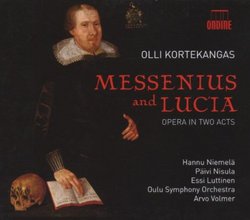| All Artists: Hannu Niemelä, Jaakko Kuusisto, Riku Pelo, Olli Kortekangas, Arvo Volmer, Essi Luttinen, Oulu Symphony Orchestra, Paivi Nisula, Lassi Virtanen, Elli Seeskorpi, Jani Posti, Kasper Parkkinen, Pertti Sveholm Title: Olli Kortekangas: Messenius and Lucia Members Wishing: 0 Total Copies: 0 Label: Ondine Original Release Date: 1/1/2006 Re-Release Date: 8/22/2006 Genre: Classical Style: Opera & Classical Vocal Number of Discs: 2 SwapaCD Credits: 2 UPC: 761195107324 |
Search - Hannu Niemelä, Jaakko Kuusisto, Riku Pelo :: Olli Kortekangas: Messenius and Lucia
 | Hannu Niemelä, Jaakko Kuusisto, Riku Pelo Olli Kortekangas: Messenius and Lucia Genre: Classical |
Larger Image |
CD Details |
CD ReviewsThe truth about Johannes Messenius Juha K. Tapio | Oulu, Finland | 01/22/2007 (5 out of 5 stars) "Olli Kortekangas' opera Messenius and Lucia tells the story of Johannes Messenius, historian and keeper of the archives for the king of Sweden, who was condenmed to life-time imprisonment at Kajaani Castle, a remote outpost near the then Swedish-Russian border, because of his Catholic sympathies - at that time a serious crime in the militantly Protestant Sweden.
It is the story of a man who had to betray his own innermost convictions to further his career and his family's situation in life, and to seek fame and fortune as a historian. Even though set 400 years in the past (Messenius lived 1580 - 1636), the story compares well also with life in the modern times, because many of us living in the modern society also have had to sacrifice something vital for similar reasons - for advancement of a career, or the accumulation of fame and material gain. The opera asks the all-important question: at what price is this done? So the story appears to be a variant of the Faust legend, in which the Devil is not an outward force but rather a part of Messenius himself - his soul. For it is immortality which Messenius seeks; and a kind of immortality is ultimately granted to him in the form of the 17-volume history of Sweden on which he worked even during the long prison years. Right at the outset, we are plunged into the philosophical heart of the matter when Karla, an art student, ponders over an enigmatic portrait painting of Messenius (printed also on the record cover; the original now hangs in the Cathedral of Oulu, Finland, the town where Messenius died). "Who are you, Johannes Messenius?" Karla asks. And suddenly, the portrait starts to talk with her. There follows a most interesting conversation on historical "truth" and how it can be found - if, indeed, it can be found at all... The rest of the story is presented as a series of scenes and tableaux that tell the life story of Messenius, from his humble origins in Sweden as a miller's son and school years spent at a Jesuit school in Eastern Prussia, to the dreary years of imprisonment and final break-up of his family. Kortekangas' music is variable in style without being too dissonant, blending atonality, hymn-like chant, Ligetian sound fields, and the kind of melodicism that one hears in Sallinen's operas. However it forms a unified and powerful whole. Of the singers, the sopranos are especially convincing - Essi Luttinen is a forceful Karla and Päivi Nisula gives a spirited performance as Lucia, Messenius' wife, who ardently loves her husband in spite of his misfortunes and double-dealing, even though she cannot always accept his doings. The male singers are slightly less impressive, even though all are perfectly adequate in their roles. There is at least one aria which shows all the promise of becoming a classic; that is the aria sung by Lucia towards the end of the opera ("The brown gold of your hair"). It is one of those hauntingly beautiful, unforgettable melodies heard so often in Finnish music. The Oulu Symphony Orchestra plays splendidly (and I'm NOT saying this just because it happens to be the orchestra of my home town). The clear and spacious recording gives proper testimony to the excellent acoustics of Madetoja Hall, place of the recording. This is, then, a very approachable modern opera which can because of its melodic qualities, be recommended even to those listeners who in general shun away from modern opera. It is also remarkable for a libretto (by the writer Juha Seppälä) which gives food for thought also for the more philosophically-oriented listeners. Highly recommended! " |
